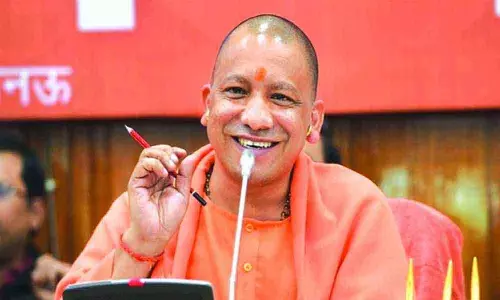
Plus 25, Minus 2.5
text_fieldsThe Central Government's decision to reduce the central levy on petrol and diesel by Rs 1.50 per litre and to ask the petroleum companies to reduce the price of fuels by a rupee, definitely comes as a relief, albeit marginal.
Not that when prices are rocketing, the reduction will offerhuge comfort. But that the thought about the people's hardship has hit those at the helm, is a positive sign. Already demonetization and Goods & Services Tax (GST) had broken the back of small and medium scale traders. Daily life of the common man hadbecome unbearable. On top of that came the burden of fuel prices increasing every day. Although some central miniser had floated a theory petrol and diesel price would not affect the common man, that has not gone down well with the people who feel the real suffering resulting from government's finance management.
Narendra Modi had appealed for votes with a promise that he would bring down fuel price and increase the value of the rupee. Not only that these did not happen, we had a spectacle of fuel prices crossing Rs eighty and the value of the dollar against the rupee hitting above seventy. Even when crude oil price nosedived in the international market, domestic fuel prices kept on increasing. With the Centre giving up control of fuel prices, it has for some time been giving the stock reply that there is nothing the government can do about it. In fact the latest decision of price reduction is an implicit admission that the said contention is not correct. But the government explanation gives the sense that this is just a political gimmick. The country is approaching elections. The economy is crushing the common man. Prices of essential commodities have been on the rise till very recently, but it has not gone down much. At the same time, the farmers' woes have only multiplied. In such a situation, the government's emphasis appears to be on quick fixes necessary to face the voters rathar than major steps to mitigate the suffering of the people. The Centre, which reduced its levy by one and a half rupees, asks the states to reduce their tax by two and a half rupees.
Although this may be convenient for the Centre to argue that it has done what it has to do and the remaining responsibility is with the states, the fact is that the party that can do still more is the Centre itself. The first thing is to bring fuel price under GST and to abolish other taxes and levies. The initiative for this has to come from the Centre. It is illogical, and even deceptive, that GST which was launched with the slogan of one country-one tax, does not apply to fuel which is the biggest source of tax. The people are made to bear the double burden of the damage from GST and the arbitrary tariff structure of fuel price. The only logic behind this is to squeeze the maximum possible. Another step the Centre can take in this regard is to drastically cut the tariff on fuel. There would be some fairness if the Centre did this and then asked the states to slash the tax (VAT). Today, tariff and taxes are so high that fuel prices are double that can be charged based on current international prices. Even when international crude prices fell, the Centre had been increasing rates of tax. The country has also been refining crude oil and exporting fuel products at prices far below the domestic levels.
The heavy burden on the people are the central and state taxes that amount to over hundred percent. The latest reduction in tariff, forms a mere tenth of what it had increased. Ours is the country with the highest level of tax among south Asian countries. Since 15 August alone, fuel prices were increased on more than 30 occasions. When 130 per cent of the amount charged on fuel comes from such increases (300 per cent in the case of diesel), the income of states increased by 34 per cent. When crude oil price was 109 dollars per barrelin 2013, the price here was 74 rupees per litre – and the BJP had argued then that even that was very high. Then after Modi government took office, this year crude oil price fell to 76 dollars per barrel, and we find fuel price standing at 80 rupees! Thus, after having increased the price by Rs 25, it is a mockery of the people to reduce it by Rs 2.50.
What is needed is to bring fuel price under GST or, if that is not feasible, make considerable reduction in the taxes charged by the Centre and states. There are some who attempt an argument that higher fuel price will force a reduction in use of fuel, and it will eventually benefit the environment. There is undoubtedly a need to reduce the consumption of fuel. But that can be achieved only by developing alternate sources of energy. Raising fuel price to unbearable heights through flawed economic policies and then justifying it as transition to 'clean energy' can at best be called laughable.























